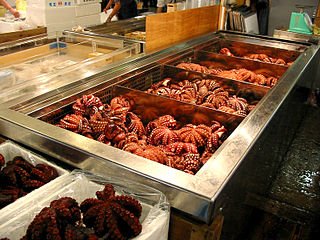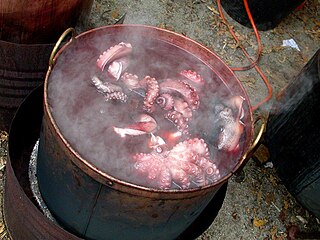 W
WHumans of some cultures eat octopus. The arms and sometimes other body parts are prepared in various ways, often varying by species and/or geography.
 W
WNakji-bokkeum (낙지볶음) or stir-fried octopus is a popular dish in Korea that is relatively recent, with origins only dating back two centuries and first being introduced in 1965.
 W
WPolbo á feira alternatively known as pulpo estilo feira is a traditional Galician dish.
 W
WPulpo a la campechana is a traditional dish in Mexican cuisine. It consists of chopped octopus that is slowly boiled in water with its ink, vinegar, onion, garlic. The cooked octopus is mixed with a preparation of tomatoes, onion, garlic, coriander leaves, chile ancho and wine. It is served with white rice.
 W
WSan-nakji (산낙지) is a variety of hoe made with long arm octopus, a small octopus species called nakji in Korean and is sometimes translated into "baby octopus" due to its relatively small size compared to the giant octopus. The octopuses are most commonly killed before being cut into small pieces and served, with the nerve activity in the octopus' tentacles making the pieces move posthumously on the plate whilst served. The octopus' highly complex nervous system, with two-thirds of its neurons localised in the nerve cords of its arms, lets the octopus show a variety of reflex actions that persist even when they have no input from the brain. Less commonly, a live octopus is eaten whole. The dish is sprinkled with sesame oil and toasted sesame seeds.
 W
WSquid lūʻau is a traditional Native Hawaiian cuisine food and part of modern fusion cuisine of Hawaii. It is made with squid, taro (kalo) leaves, coconut milk, garlic, water, and Hawaiian salt.
 W
WTakoyaki (たこ焼き or 蛸焼) or "octopus balls" is a ball-shaped Japanese snack or appetizer made of a wheat flour-based batter and cooked in a special molded pan. It is typically filled with minced or diced octopus (tako), tempura scraps (tenkasu), pickled ginger, and green onion (negi). The balls are brushed with takoyaki sauce and mayonnaise, and then sprinkled with green laver (aonori) and shavings of dried bonito (katsuobushi).
 W
WYeonpo-tang or yeonpo-guk (연폿국) is a Korean soup made with beef, radish, tofu, and kelp stock. It is traditionally made and offered on the day of funeral procession.